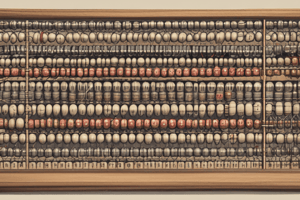Podcast
Questions and Answers
The first tool for computation, known as the ______, was used for basic arithmetic operations around 3000 BCE.
The first tool for computation, known as the ______, was used for basic arithmetic operations around 3000 BCE.
Abacus
Charles Babbage designed the ______ Engine in the 1830s, which is considered the first concept of a general-purpose computer.
Charles Babbage designed the ______ Engine in the 1830s, which is considered the first concept of a general-purpose computer.
Analytical
The first general-purpose electronic digital computer, known as ______, was developed in 1945.
The first general-purpose electronic digital computer, known as ______, was developed in 1945.
ENIAC
The introduction of ______ in 1947 replaced vacuum tubes, making computers smaller and faster.
The introduction of ______ in 1947 replaced vacuum tubes, making computers smaller and faster.
The development of ______ in the 1970s led to the creation of personal computers.
The development of ______ in the 1970s led to the creation of personal computers.
The precursor to the modern Internet was known as ______, developed in 1969.
The precursor to the modern Internet was known as ______, developed in 1969.
Tim Berners-Lee invented the ______ in 1989, making the Internet more accessible to the general public.
Tim Berners-Lee invented the ______ in 1989, making the Internet more accessible to the general public.
Smartphones like the ______ introduced in 2007 revolutionized computing and made it mobile.
Smartphones like the ______ introduced in 2007 revolutionized computing and made it mobile.
Flashcards are hidden until you start studying
Study Notes
Early Beginnings
- Abacus, originating around 3000 BCE, served as a fundamental tool for basic arithmetic calculations.
- Mechanical calculators emerged in the 17th Century, notable examples being Blaise Pascal's Pascaline and Gottfried Wilhelm Leibniz's Step Reckoner.
The Birth of Computers
- Charles Babbage conceived the Analytical Engine in the 1830s, recognized as the first theoretical model of a general-purpose computer, though it was never constructed.
- Ada Lovelace contributed significantly to Babbage's work and is often acknowledged as the first computer programmer for her algorithm for the Analytical Engine.
The Electromechanical Era
- Alan Turing, in the 1930s, introduced the Turing Machine concept, establishing foundational ideas for modern computing.
- ENIAC, developed in 1945, marked the advent of the first general-purpose electronic digital computer, built during World War II.
The Advent of Modern Computers
- The invention of transistors in 1947 replaced vacuum tubes, resulting in smaller, faster, and more dependable computers.
- Integrated circuits emerged in the 1960s, miniaturizing electronic components further and enhancing computer power and compactness.
The Personal Computer Revolution
- The 1970s saw the rise of microprocessors, leading to the birth of personal computers (PCs).
- Key models included the Apple I, launched in 1976, and the IBM PC, introduced in 1981.
- Microsoft became dominant with its Windows operating system, while Apple prioritized user-friendly experiences through the Macintosh.
The Internet and Connectivity
- ARPANET, established in 1969, served as the precursor to the Internet, initially aimed at military and research users.
- The World Wide Web, invented by Tim Berners-Lee in 1989, enhanced Internet accessibility, introducing navigation via hyperlinks and browsers.
The Mobile and Cloud Era
- The introduction of smartphones, beginning with the iPhone in 2007, revolutionized computing, enabling mobile and on-the-go access.
- Cloud computing emerged, facilitating online data storage and processing, leading to services like Amazon Web Services (AWS) and Google Cloud.
Artificial Intelligence and Beyond
- The 2010s to present has seen rapid advancements in artificial intelligence (AI) and machine learning, transforming various industries through automation and data analysis.
- Quantum computing is an emerging field, offering potential solutions to complex problems at speeds surpassing traditional computing, based on principles of quantum mechanics.
Studying That Suits You
Use AI to generate personalized quizzes and flashcards to suit your learning preferences.




